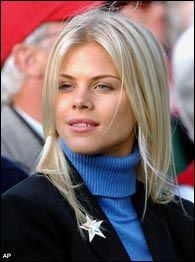The article got me thinking about what it takes to raise an athlete capable of competing at the highest levels. What is it that separates a Peyton Manning from a guy who never got past second string in high school? The simplest answer is talent, but that's not the end of the discussion. Even among individuals of similar talent, there's a wide range of degrees of success. What influences that success? For the purpose of this discussion, I'll limit the factors to those related to parenting.
In terms of athletes whose success was impacted by their parents, there are two ends of the spectrum. On one end, there's Tiger Woods, taught golf primarily by his father, tremendously driven and tremendously successful. He seems happy with his career and how things turned out. And why not? Have you seen his wife?

Who needs golf when you have Elin Nordegren?
On the other end of the spectrum, there's Todd Marinovich. Trained his entire life to be an NFL quarterback, he apparently cracked under the pressure, and a variety of off-the-field problems led to the end of his NFL career a year after it began.
So what's the difference between the two? Both were clearly talented, and both had fathers that pushed them to be the best athlete they could be. The difference, I'd say, lies in the desire. Tiger Woods wanted to be the best golfer ever. According to Tiger and his late father, it wasn't that Earl Woods made Tiger practice, it was that Tiger made his father practice with him. The decision to become a golfer was his own.
I don't know as much about Marinovich's situation, but I'd argue that he wasn't given nearly as much choice in the matter as Tiger. If he wasn't given a chance to say "I don't want to play football," then all he could do was go along for the ride, doing what he was told. Then one day, he realized he was on his own; nobody was telling him what to do. He didn't have to play football, and perhaps he didn't want to play football, but football was about all he knew. So he ended up with the variety of problems detailed in the article above.
So, the trick to raising a superstar is to have a kid that wants to be a superstar, and making sure the choice is his own. Pushing a child, or anyone really, to be someone that they aren't doesn't work in the long run. This is not to say that a parent shouldn't push his kid to get better. On the contrary, that's a very important part of it. Would Tiger have been half the golfer he is today if his father didn't care what his son was doing? Unlikely.
In conclusion, if you want to raise a successful child, all you need to do is have a kid with talent and desire, and push him to be as good as he can be. That's all it takes. You can trust me, I'm entirely qualified to have an opinion on raising children.
No comments:
Post a Comment